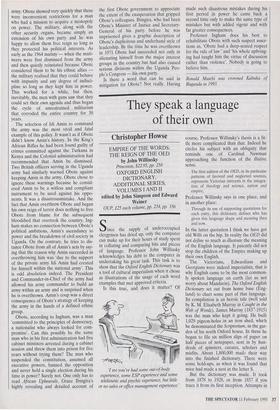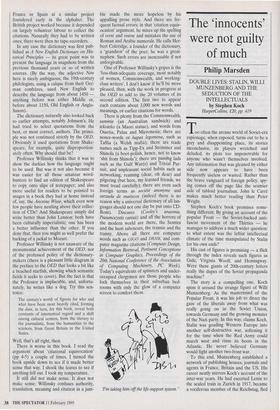They speak a language of their own
Christopher Howse
EMPIRE OF THE WORDS: THE REIGN OF THE OED by John Willinsky Princeton, $22.95, pp. 258 OXFORD ENGLISH DICTIONARY, ADDITIONAL SERIES, VOLUMES I AND II edited by John Simpson and Edward Weiner OUP, .f25 each volume, pp. 234, pp. 336 Since the supply of underoccupied clergymen has dried up, only the computer can make up for their hours of study spent in collating and comparing bits and pieces of language. Professor John Willinsky acknowledges his debt to the computer in undertaking his great task. This task is to show that the Oxford English Dictionary was a tool of cultural imperialism when it chose as illustrations of the usage of each word examples that met approved criteria.
Is this true, and does it matter? Of
7 see you've had some out-of-body experience, some ESP experience and some telekinetic and psychic experience, but little or no sales or office management experience.'
course, Professor Willinsky's thesis is a lit- tle more complicated than that. Indeed he circles his subject with an obliquity that reminds one of Cardinal Newman approaching the function of the illative sense.
The first edition of the OED, in its particular patterns of favored and neglected sources, represents Victorian interests in the integra- tion of theology and science, nation and empire,
Professor Willinsky says in one place; and in another place:
Through its use of supporting quotations for each entry, this dictionary defines who has given this language shape and meaning then and now,
In the latter quotation I think we have got old Willi on the hip. In reality the OED did not define so much as illustrate the meaning of the English language. It patently did not stop the children of the Empire making up their own English.
The Victorians, Edwardians and Georgians were indeed imperialists; that is why English came to be the most common- ly spoken language on earth (let us not worry about Mandarin). The Oxford English Dictionary set out from home base (Eng- land) to chart some part of that language. Its compilation is an heroic tale (well told by K. M. Elisabeth Murray in Caught in the Web of Words). James Murray (18r-1915) was the man who kept it going. He built 1,029 pigeon-holes in an iron shed, which he denominated the Scriptorium, in the gar- den of his north Oxford house. In these he began to file six million slips of paper on half pieces of notepaper, sent in by hun- dreds of spinsters, curates, scholars and misfits. About 1,800,000 made their way into the finished dictionary. There were some hold-ups, as when it was found that mice had made a nest in the letter S.
But the dictionary was made. It took from 1878 to 1928, or from 1857 if you trace it from its first inception. Attempts in France or Spain at a similar project foundered early in the alphabet. The British project worked because it depended on largely volunteer labour to collect the citations. Naturally they had to be written ones; there were then no tape-recorders.
In any case the dictionary was first pub- lished as A New English Dictionary on His- torical Principles — its great point was to present the language in snapshots from the previous thousand years or so of written sources. (By the way, the adjective New here is nicely ambiguous; the 19th-century philologists, using a calque from their Ger- man confreres, used New English to describe the language from about 1450 anything before was either Middle or, before about 1150, Old English or Anglo- Saxon).
The dictionary naturally also looked back to earlier attempts, notably Johnson's. He had tried to select quotations from the best, or most correct, authors. The princi- ple was not continued strictly by the OED. Obviously it used quotations from Shake- speare, for example, quite disproportion- ately often. Why should that be?
Professor Willinsky thinks that it was to show the darkies how the language ought to be used. But was it not also because it was easier for all those amateur word- hunters to find an edition of Shakespeare to copy onto slips of notepaper; and also more useful for readers to be pointed to usages in a book they had at home instead of, say, the Ancrene Wisse, which even now few people have nestling above their collec- tion of CDs? And Shakespeare simply did write better than John Lennon: both have been culturally imperialistic; one has been a better influence than the other. If you deny that, then you might as well prefer the barking of a jackal to Mozart.
Professor Willinsky is not unaware of the monumental achievement of the OED, nor of the professed policy of the dictionary- makers (there is a pleasant little diagram in the preface to the OED that looks a bit like a beached starfish, showing which semantic fields it seeks to cover). But the fact is that the Professor is implacable, and, unfortu- nately, he writes like a dog. Try this sen- tence: The century's worth of figures for who and what have been most heavily cited, forming the data, in turn, for this book, reveal both constants of intertextual regard and a shift among cultural centers, from the literary to the journalistic, from the humanities to the sciences, from Great Britain to the United States.
Well, that's all right, then.
There is worse in this book. I read the argument about `citational equivocation' (pp 4-5) a couple of times. I turned the book upside down to see if it made better sense that way. I shook the leaves to see if anything fell out. I took my temperature.
It still did not make sense. It does not make sense; Willinsky confuses authority, translation, meaning and citation in a jum- ble made the more hopeless by his appalling prose style. And there are fre- quent factual errors; in that 'citation equiv- ocation' argument, he mixes up the spelling of verse and vearse and mistakes the use of Roman and Arabic numerals. He calls Her- bert Coleridge, a founder of the dictionary, a 'grandson' of the poet; he was a great- nephew. Such errors are inexcusable if not unforgivable.
One of Professor Willinsky's gripes is the 'less-than-adequate coverage, most notably of women, Commonwealth, and working- class writers'. I don't know if he'll be more pleased, then, with the work in progress at the OED to add to the 20 volumes of its second edition. The first two to appear each contains about 3,000 new words and meanings, or earlier citations for words.
There is plenty from the Commonwealth, sammie (an Australian sandwich) and tekoteko (a Maori statue), and words from Ossetia, Palau and Micronesia; there are nonce-words or hapax legomena, such as Taffia (a Welsh mafia); there are trade names such as Tipp-Ex and Strimmer and Shinola (a boot-polish, hence, not to know `shit from Shinola'); there are passing fads such as the Gulf War(s) and Trivial Pur- suit, and unpleasant social habits such as networking, reaming (dear, oh dear) and pilgering (but here, my learned friends, we must tread carefully); there are even such foreign terms as societe anonyme and zatzuela de mariscos (indeed there is no reason why a universal dictionary of all lan- guages should not one day be put onto CD- Rom). Diseases (Cooley's anaemia, Pneumocystis carinii) and all the horrors of the modern world are there, the Semtex and the hunt saboteurs, the trannie and the tranny. Above all there are computer words such as GIGO and DRAM, and com- puter magazine citations (Computer Design, Information Retrieval Pertinent Conceptions in Computer Graphics, Proceedings of the 20th National Conference of the Association of Computing Machinery, PC Week). Today's equivalents of spinsters and under- occupied clergymen are those people who lock themselves in their suburban bed- rooms with only the glow of a computer screen to comfort them.
`I'm taking him off the life-support system.'



























































 Previous page
Previous page